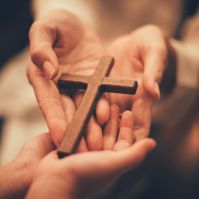 Nowadays there are some individuals that avoid labels like the plague. You might notice this if you start talking to a friend about a person or idea and are cut off and informed that he doesn't want to use a word that will put the referent in a box. I have engaged in discussions on what it is about descriptive words that seems wrong to some and how communication requires a shared vocabulary of descriptors to convey ideas effectively. This is particularly interesting when considering one's ordination in the interfaith Universal Life Church. When you get ordained, what are you, and does answering that question preclude the possibility of evolving? Do the labels you apply to yourself when you get ordained have any impact on your ability to conduct a ministry or perform a wedding, and if so, is this unique to religious circumstances or can this shed any light on the notion of labels generally?
Nowadays there are some individuals that avoid labels like the plague. You might notice this if you start talking to a friend about a person or idea and are cut off and informed that he doesn't want to use a word that will put the referent in a box. I have engaged in discussions on what it is about descriptive words that seems wrong to some and how communication requires a shared vocabulary of descriptors to convey ideas effectively. This is particularly interesting when considering one's ordination in the interfaith Universal Life Church. When you get ordained, what are you, and does answering that question preclude the possibility of evolving? Do the labels you apply to yourself when you get ordained have any impact on your ability to conduct a ministry or perform a wedding, and if so, is this unique to religious circumstances or can this shed any light on the notion of labels generally?
For those that reject labels, the argument usually goes something like this: labels come with connotations that may be erroneous or harmful and fail to capture the essence of the person or idea, particularly on issues of religious belief or sexual identity. Conversely, the argument against this is that this view dramatically decreases our ability to convey ideas about a person or idea. Almost all words are labels for some thing or idea and saying some of these are valid and some aren't draws an arbitrary and indefensible distinction. The point that labels don't capture the essence of a thing is moot, as assigning a label doesn't preclude also assigning others.
In the realm of getting ordained, both of these views can be useful to consider. Some labels actually can affect your ability to perform a wedding. I've received calls from county clerks regarding someone putting wizard or wedding officiant as their title on the marriage license. In these instances, for the sake of the validity of the marriage, I request that the title be changed to something more traditional like minister. Wizard, for some clerks, carries the connotation of belonging to an organization that does not satisfy the legal requirements to solemnize marriage. Wedding officiant lacks the religious nuance that is necessary.
To some extent, this validates the rejection of labels, particularly if your beliefs and practices do not match those of a minister, and are more in line with Wiccan traditions for example. It also gives credence to the usefulness of labels, as merely switching the word on the marriage license to something that satisfies local requirements grants one the ability to perform a wedding. No, this word may not be accurately capturing your views and practices, but notice we can still assign a different label outside of legal context and fulfill the liberties extended to you when you get ordained in the Universal Life Church.
For the more general question of labeling, we think it is safe to say that the concerns raised by opponents are justified, but getting rid of descriptive words is throwing the baby out with the bathwater. We should always remember that not every discussion of a person must capture his or her entire essence, and that we shouldn't pile on ideas from word choices that aren't actually being conveyed. Describing someone also doesn't stop us from deciding at a later time that the words are no longer accurate. The same is true in the Universal Life Church; you have the freedom to change your views or convert to a different religion and still maintain your legal status. This is a unique aspect of joining this church. There are many destinations for your spiritual journey and many paths to each. We leave it to you to decide.



